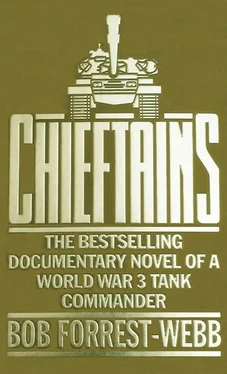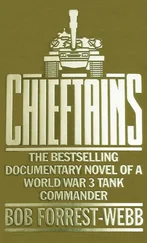Someone said: ‘Shhh…’ and the staff sergeant glowered, angrily.
‘…our ultimatum, delivered to the Soviet Foreign Minister by the British Ambassador in Moscow, gave the Soviet government until noon to indicate it would order the immediate cessation of hostilities, failing which Her Majesty’s Government, in conjunction with its NATO allies, would consider a state of war to exist between the invading members of the Soviet bloc, and the Western Alliance.
‘This assurance was not forthcoming. Consequently, the United Kingdom, the United States of America, Canada and our European allies are now at war.
‘First reports of the Soviet attack were received in London shortly before 04.00 hours this morning. Soviet artillery launched a heavy barrage along an entire front from Lübeck in the north, to the Austrian border; shortly afterwards, armour of the Russian Second Guards Tank Army invaded West German territory to the east of the city of Lübeck, and Soviet airborne troops were landed in the Fulva valley.
‘Soldiers of the 1st British Corps of the NATO Northern Army Group have been in action since the onset of hostilities in the British zone of responsibility to the east of Hannover.’
‘Too fucking true, mate,’ agreed the corporal sitting beside his transistor.
‘Shut up, Nash,’ growled the staff sergeant.
‘…NATO Defence Headquarters, now evacuated from Brussels to minimize the risk of attack on the Belgium capital, reported in a communique issued a few minutes ago that forces of Belgium, Britain, Germany, the Netherlands and United States are all involved in the fighting, and that there are at present eight major defensive actions along the entire front.
‘The communique said that the Soviet advance had been slowed down, and although no casualty figures were available those of the Soviet Union were very high.
‘Soviet fighter aircraft and medium range bombers, bearing the insignias of the Frontovaya and Dal’naya Aviatsiya have made repeated raids on the north German towns of Lübeck, Hamburg, Hannover and Braunschweig. Heavy casualties are reported among the civilian populations.
‘At 06.00 hours this morning, ministers of the North Atlantic Council, NATO’s governing body, were called into immediate session. We will have more news of that later in the broadcast.
‘In New York, the United Nations Security Council emergency debate on the crisis was resumed. Earlier today, the Soviet and Chinese delegations staged a brief walk-out when the Japanese delegates denounced the invasion of Western Europe as "wanton treachery by insatiable expansionists!" ‘
‘Sodding Chinese! Last bloody Chairman was supposed to be a mate of ours. …they’re like the bleeding Vicar of Bray.’ The staff sergeant had a pinch of dark tobacco in the palm of his hand and began rolling a match-thin cigarette.
‘…here, at home, the Prime Minister, Mr James Newlin, called the invasion an “act of unparalleled insanity and barbarity, more dangerous to the future of all mankind than any the world has ever previously experienced”. He called on all world leaders to support the determined fight to maintain the freedom of the West, and congratulated the President of the French Republic, Monster Charles Dupré, on his government’s decision to join those of the NATO alliance in the defence of West Germany. Five divisions of the French First Army, including three mechanized divisions, are expected to move eastwards in support of the American forces.
‘In Turkey, Soviet forces crossed the frontiers at Batumi, Yerevan and Nachichevan, while a Soviet naval assault force has made landings on the Turkish Black Sea coast between Sinop and Samsun. Concentrations of Bulgarian troops have been reported on the Turko Bulgarian frontier at Malko, three hundred and twenty kilometers from Istanbul.
‘In Yugoslavia, despite strong resistance, Soviet authorities this morning announced the capture of Novi Sad and Belgrade. Throughout the early hours of today Belgrade Radio played continuous recordings of the Yugoslav national anthem. This was silenced a little after 09.00 hours…’
‘That’ll do, Corporal. Turn it off now.’ The staff sergeant’s slim cigarette was already a butt between his lips. He picked it out carefully, and dropped it into a near empty mug on the table. ‘All right you lot, don’t hang around… get back to your work… this is an official war we’ve got… earn your bloody money…’
The headquarters of the Commander-in-Chief of the Allied Forces in Northern Europe was situated, temporarily, a few kilometers east of Münster. Commander-in-Chief, General Sir Alexander Dormer, had moved his staff two days previously eastwards from Rheindahlen to its present battle headquarters. He had slept for less than three hours in the past twenty-four, but a Benzedrine tablet had cleared fatigue from his mind. There would be time for rest when the situation in NORTHAG became more settled.
Dormer was feeling satisfied with the intelligence reports he was receiving. The Russian forces were continuing their advance, which had been expected. But the advance had been neither as fast, nor had the initial penetration been as deep, as had been forecast. Their losses in the first kilometers had been astronomical, despite their advantages in military strength, their armour outnumbering that of the NATO forces by almost three to one.
Three to one. Sheer weight, Dormer knew, could win a war no matter how dogged the adversary. There had been sufficient warnings given over the past few years, and yet many of the NATO governments had ignored them, seeking political popularity while endangering the future military security of their countries. Britain had been no exception; in 1980, the British military budget had been cut by two hundred million pounds.
There had been an attempt, far too late, to redress the military balance, but many engineering companies which could have been used on military projects had gone to the wall during the recession, and new ones to replace them had not been fully developed. Defence projects had been allowed to decay too far to be hurriedly salvaged. Much of the NATO weaponry was out-dated and long-serviced, but what there was of it was being well used. To his present satisfaction, the 1st British Corps were giving a good account of themselves, as were the men of the German and Belgian forces. In the north the Netherland Corps, reinforced by the German Federal Republic’s territorial army, had slowed the Soviet forces east of Hamburg.
It had been no surprise to Dormer when the French entered the war immediately it had begun. He had worked closely with their High Command many times and never doubted their intentions, despite their government’s apparent determination to remain non-commital. The French armour was already being brought into reserve, behind the American army in CENTAG.
The Atlantic air-bridge, ‘Reforger’, was not only holding but was growing rapidly. The massive Lockheed CXs which had been built in increasing numbers over the past five years, and the old Galaxies, were now proving their worth With near maximum payloads of 220,000lbs — as much as two M-60 tanks, or three helicopters — they were refuelling in the air while en route from the USA to the airbases in Europe. Most aircraft of the European and American civil airlines had been immediately brought into service as troop and supply carriers. Dormer was feeling increasingly confident that if the Soviet advance could be contained for a further forty-eight hours they might be willing to negotiate a peace. At this stage, when negotiation was still possible, he did not personally believe there was much likelihood of a nuclear war developing. Though he had little respect for Russian leadership, he did not consider them to be maniacs. They would demand a high price for peace, perhaps even the re-unification of Germany under Soviet control, and it would then be for politicians, not soldiers, to decide if the ransom should be met.
Читать дальше












